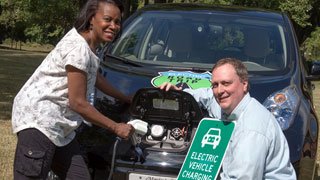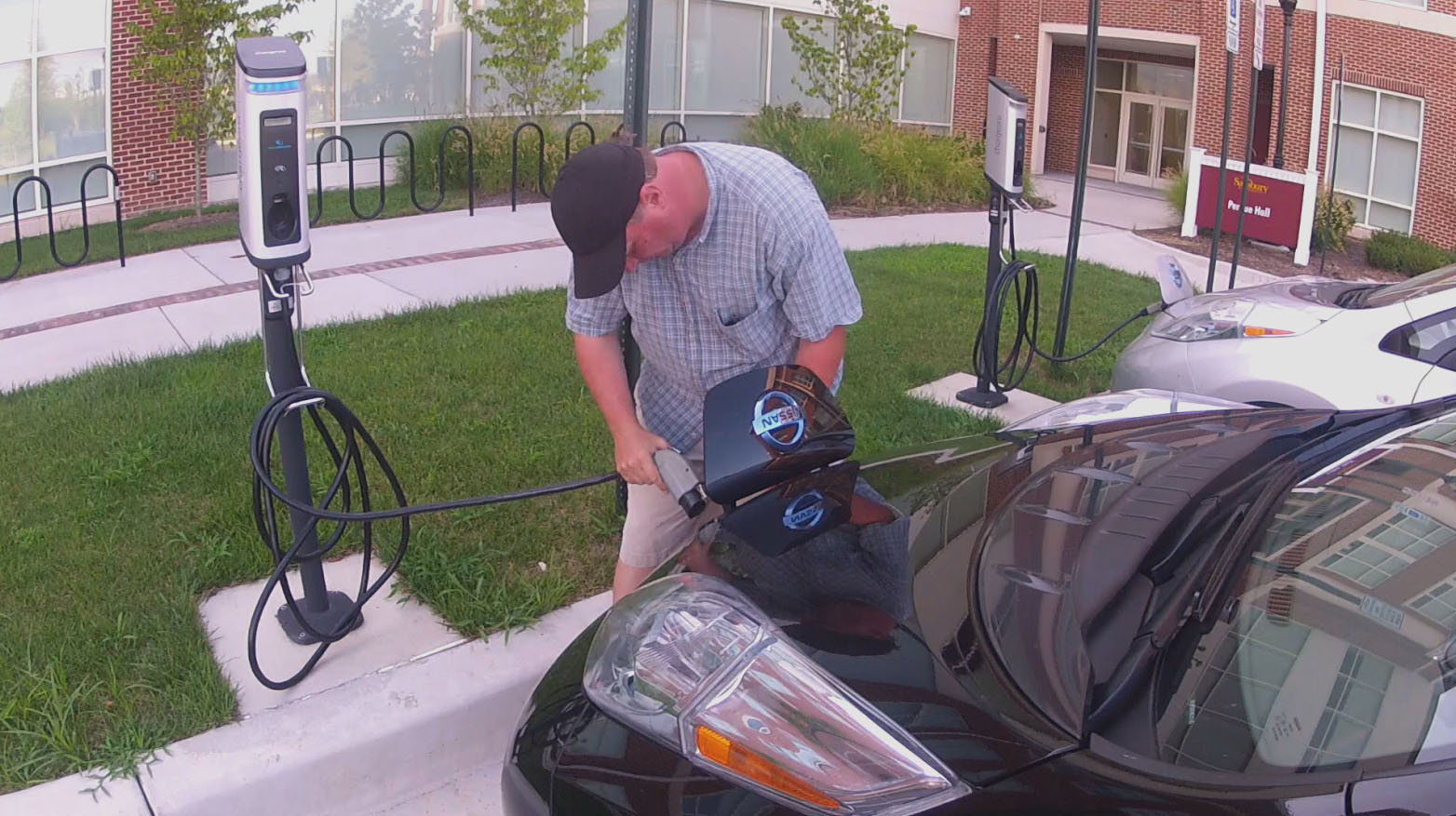MPT's 'Electric Road Trip' Features SU Apr. 23
 SALISBURY, MD---When 黑料网 became home to the Eastern Shore’s first public electric vehicle charging stations in 2011, University officials saw the distinction as a point of pride.
SALISBURY, MD---When 黑料网 became home to the Eastern Shore’s first public electric vehicle charging stations in 2011, University officials saw the distinction as a point of pride.
Jonathan Slade and Novia Campbell saw it as a challenge.
The filmmakers from Lineboro, MD, purchased a Nissan Leaf in 2012, fulfilling Slade’s lifelong dream: “I was always interested in electric cars, even when I was a kid,” he said. “It always seemed like something that was just over the horizon.”
With the new Leaf parked in their driveway, they began to wonder how far they could drive it. Electric vehicle charging infrastructure in and around Baltimore was dense, but charging stations were sparse beyond the metropolitan area, Campbell said.
Discovering an app called PlugShare that mapped charging stations nationwide, Slade began plotting daytrips that took the couple further and further from home. Within about two months of pushing the limits of how far they believed they could travel, Slade became intrigued by a particular entry on the app.
“One day I saw there were charging stations at 黑料网, and I thought, ‘I wonder if we can get there,’” he said.
The plan to take the 145-mile trip soon evolved into a much larger undertaking that the couple would consider the ultimate challenge: They would drive from one end of Maryland to the other, 520 miles from Oakland to Ocean City, and film the journey.
The resulting documentary, Electric Road Trip, is scheduled to debut on Maryland Public Television 8 p.m., Wednesday, April 23, as part of MPT’s 10th annual Chesapeake Bay Week celebration.
Along the way, the couple met a number of locals and toured area attractions. Their most interesting interaction, however, came while plugged in at SU. As they approached the SU charging stations, located near Perdue Hall, they saw a rare site: another Nissan Leaf, also charging.
Intrigued, they left a note on the car’s windshield, offering a brief explanation of their project and asking the owner to call and chat. The driver, Thomas Ayd, did call… and invited them to his house for crabs!
the owner to call and chat. The driver, Thomas Ayd, did call… and invited them to his house for crabs!
“One of the challenges of owning an electric car is, what do you do while the car is charging?” said Slade. “We were walking around the campus, which was beautiful, and 10 minutes later we were eating crabs.”
“That was definitely the highlight of the whole trip,” said Campbell.
The invitation came at an especially good time to lift the filmmakers’ spirits. An inaccurate listing on the app had recently left them stranded in Easton, MD, where they “trickle charged” for three hours at the Talbot County Visitors Center to give their car enough power to reach SU’s charging stations.
Trickle charging, using regular power outlets, is less effective and can take up to 20 hours to reach a full charge, Slade explained. Vehicle chargers, like the ones at SU, take only five to six hours if the car’s battery is completely empty.
Because the drive took place in late July 2012, the couple also was feeling the effects of the weather by the time they reached Salisbury.
“It was the hottest week, of course, and in an electric vehicle, you don’t want to run the air conditioner because it takes more power,” said Campbell.
Refreshed from their crab feast and their self-guided tour of SU, they continued on to Ocean City and the journey’s end. However, they were not through with Salisbury.
The charge at SU gave the car enough charge to reach the beach, but once the cameras were off, they had to make the return trip home. That meant another charging stop at SU, which also gave them time to patronize some of the area businesses, including Wendy’s, Five Guys Burgers and Fries and Ruby Tuesday. They spent the night at the Hampton Inn in Fruitland, predominately because of its proximity to the University.
Campbell noted the economic impact charging stations can have for businesses, adding that the couple goes to a particular grocery store at home — one they had not previously patronized — largely because the charging stations in its parking lot allow them to refuel while shopping.
As for the stations at SU, Campbell called them “a lifesaver,” cutting at least a day off their trip that would have been spent trickle charging. She and Slade also noted the number of recycling receptacles at the University, an observation she said made it into the documentary.
SU’s sustainable initiatives “show what an impact, even outside of the classroom, that a university can have on a community,” she said.
Slade said his one concern while shooting the documentary was that the electric vehicle charging infrastructure in Maryland would have increased so much between the filming and the air date, some of their adventures may have seemed outdated.
For better or worse, he said, that is not the case. To his knowledge, SU’s charging stations are still the only public facilities of their kind on the Eastern Shore.
For more information about the documentary visit .
For more information about SU’s sustainable initiatives call 410-543-6030 or visit the SU website at www.salisbury.edu/sustain.
